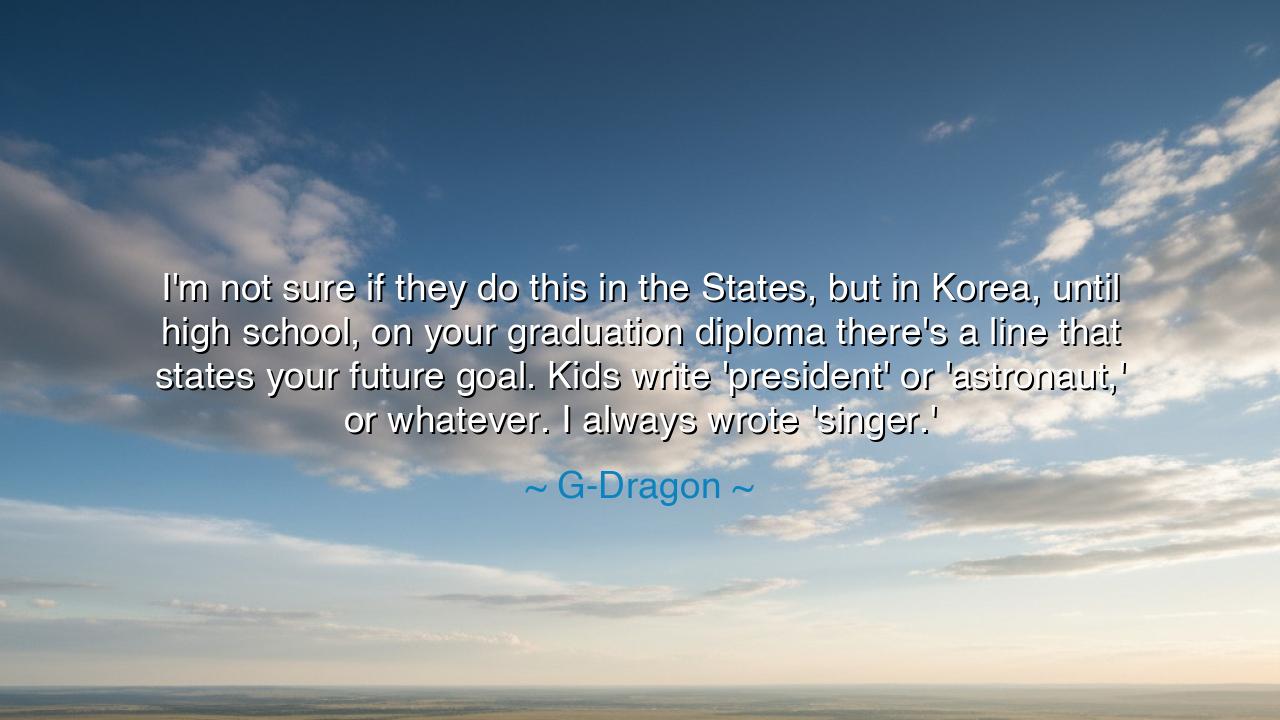
I'm not sure if they do this in the States, but in Korea, until
I'm not sure if they do this in the States, but in Korea, until high school, on your graduation diploma there's a line that states your future goal. Kids write 'president' or 'astronaut,' or whatever. I always wrote 'singer.'






In the reflective and heartfelt words, “I’m not sure if they do this in the States, but in Korea, until high school, on your graduation diploma there’s a line that states your future goal. Kids write ‘president’ or ‘astronaut,’ or whatever. I always wrote ‘singer,’” G-Dragon reveals the sacred simplicity of childhood conviction — that pure, unshaken faith in one’s calling that defies the cynicism of adulthood. Beneath the humility of his words lies a radiant truth: that dreams declared early, when the soul is still unscarred by fear, possess a mysterious power to shape destiny. His reflection is not merely about ambition, but about the courage to name one’s purpose before the world has yet believed in it.
The origin of this quote lies in the cultural and personal traditions of Korea, where education is both a path of discipline and a mirror of identity. In Korean schools, students often record their future goals as a symbolic act — a gesture of self-definition and hope. It is both a wish and a vow. Most children, guided by convention, write what society deems admirable — “doctor,” “teacher,” “scientist,” or “president.” But young Kwon Ji-yong, long before the world knew him as G-Dragon, dared to inscribe a different word: “singer.” At that time, it was not a profession of security or prestige, but of uncertainty and struggle. Yet, with that single word, he declared not what he was, but who he intended to become — a testament to the power of naming one’s destiny before it takes form.
To the ancients, such an act would have been regarded as an invocation — for they believed that the spoken and written word carries the force of creation. When a child writes their dream with sincerity, the universe begins its quiet work of shaping that dream into reality. So it was with G-Dragon. His path was not easy. As a young trainee, he faced rejection, exhaustion, and doubt. The glamour that now surrounds his name was born out of years of struggle behind closed doors. But that line on his diploma — “singer” — became a torch he carried through the darkness. In every setback, that word reminded him of who he was meant to be. It was not just a label; it was a promise to his younger self.
His story calls to mind the legend of Michelangelo, who once said that he did not carve the statue, but merely removed the stone that hid the form already within. Likewise, G-Dragon’s destiny as a singer was not something constructed — it was something revealed, something that had always existed within him, waiting to be freed through discipline and faith. Just as the sculptor’s hand follows the shape of the invisible, so too does the dreamer follow the contours of an unseen future. The young boy who wrote “singer” on his diploma had already glimpsed the outline of his truest self. The rest of his life became the act of chiseling it into being.
This quote also speaks to a universal truth about identity and purpose: that the dreams of youth are often the purest reflections of who we are before the world teaches us restraint. Many forget those early declarations, burying them under the weight of expectation or fear. But those who remember — those who guard the flame of their first calling — are the ones who move through life not merely with ambition, but with authenticity. For the dream written in youth is not random; it is the soul’s first attempt to reveal its direction. G-Dragon’s faith in that early vision reminds us that the heart already knows what it was born to do — we need only the courage to listen.
History, too, offers echoes of this wisdom. Florence Nightingale, as a young girl in England, once wrote in her diary that she felt “a call from God” to serve others. At the time, nursing was seen as a menial, undesirable job. Yet she clung to that call, and it led her to reform medicine and save countless lives. Like G-Dragon, she wrote her truth before the world believed in it, and in doing so, she helped the world change its understanding of what was possible. Such examples remind us that greatness begins not in applause, but in declaration — in daring to say, “This is who I will become,” long before there is evidence to support it.
The lesson in G-Dragon’s reflection is clear: the dreams you speak, write, or whisper when you are young are not naive fantasies — they are prophecies of the heart. They may fade, they may waver, but they are rarely wrong. To honor them is to honor your truest nature. And to doubt them is to silence the part of you that knows why you were born.
The practical action is simple yet profound: remember what you once wrote, said, or dreamed of becoming. Find that word, that vision, that small spark of wonder from your youth, and let it guide you again. Speak it aloud; write it anew. Do not be ashamed if it seems small or impossible — for every great destiny once began as a single line on a piece of paper, written by a child who believed. As G-Dragon’s story reminds us, to declare your dream is to begin it — and the moment you name your purpose, the universe begins to sing with you.






AAdministratorAdministrator
Welcome, honored guests. Please leave a comment, we will respond soon